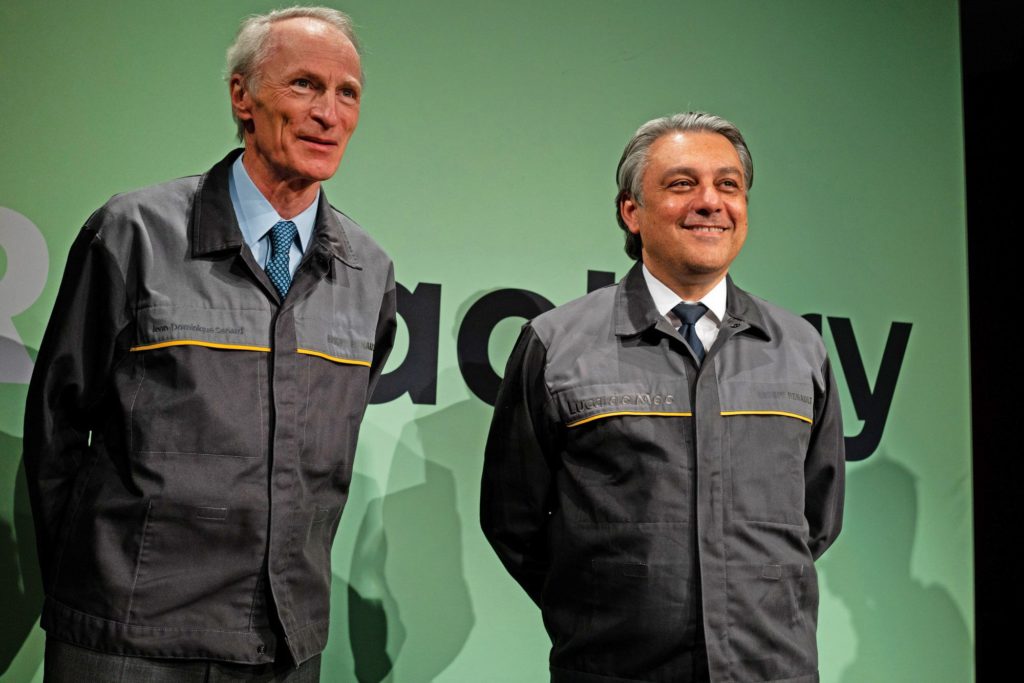(Bloomberg) —
Renault, Nissan and Mitsubishi presented a joint 23 billion-euro ($26 billion) electrification plan on Thursday as the struggling Franco-Japanese auto alliance tries to prove it’s still a force to reckon with.
The push entails rolling out 35 new battery-powered cars by the end of the decade across five common manufacturing platforms. It relies on burden-sharing when it comes to developing new technologies such as next-generation batteries, automated-driving features and software.
“These are massive investments that none of the three companies could make alone,” Renault Chairman Jean-Dominique Senard said. He told reporters and analysts the plan makes ties between the companies “totally unbreakable.”
We’ll see about that. For starters, the 23 billion-euro headline figure is comprised of funds the firms already announced separately last year, meaning their flashy presentation didn’t include any new spending. Executives were asked if the plan was lacking compared to the 89 billion euros Volkswagen has earmarked for EVs and software over the next half decade.
On the surface, the alliance’s “leader-follower” strategy — where each company occupies the driver’s seat in certain regions and for some technologies, and takes the back seat in others — makes perfect sense to cut costs and complexity.
Nissan, for example, will develop solid-state batteries, while Renault will work on over-the-air software updates, with all partners getting access to the finished products in the end.
But the model isn’t without risks. If Renault were to screw up on software, for example, all three companies would suffer. Moreover, the trio still has to compete for key components including semiconductors.
For all the smiling and happy talk Thursday, it’s hard to fathom how tensions have been fully resolved behind the scenes. The alliance nearly fell apart in the aftermath of former leader Carlos Ghosn’s arrest in 2018. Hari Nada, the mastermind behind the corporate coup to dethrone Ghosn, is still with Nissan, and there’s still a cross-shareholding imbalance that’s long been a source of tension.
Renault holds a 43% stake in the bigger Japanese company, with voting rights, while Nissan owns just 15% of Renault and has no voting rights. Senard brushed aside several questions about the shareholdings during the EV briefing, saying any change “is not on the table today.”
A lot has changed since Renault and Nissan formed their alliance in 1999. EVs at that time were a long-off prospect, Elon Musk started an online payments firm called X.com and China ranked 14th in the world when it came to producing passenger cars, behind the likes of Belgium and Mexico.
Since then, Musk has turned Tesla into the world’s most valuable automaker and made inroads in Europe, where the Model 3 overtook the Renault Zoe as the best-selling EV last year. VW and Toyota have laid out plans to splurge a combined $170 billion over the coming years to preserve their claim on an industry they’ve dominated for decades. Tech giants including Apple and Google are working on autonomous-driving technology as they try to disrupt the sector.
Senard still believes Renault, Nissan and Mitsubishi have an edge to gain by working together. “We have a tremendous amount of resources that has been optimized between our three companies,” he told Bloomberg Television’s Matt Miller in an interview. “We are now very optimistic.”
More stories like this are available on bloomberg.com
©2022 Bloomberg L.P.











